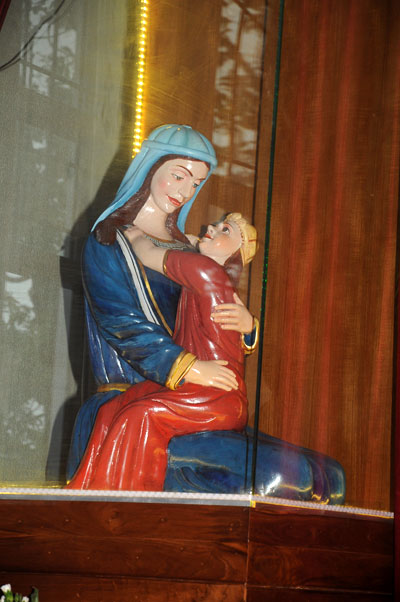
St. Kuriakose Life Story
 St. Kuriakose has been a saint, widely honoured among the early Syrian Christians. He, being a martyr, was also known as ‘Kuriakose Sahda’ and also as ‘Thalia’, meaning a child.
St. Kuriakose has been a saint, widely honoured among the early Syrian Christians. He, being a martyr, was also known as ‘Kuriakose Sahda’ and also as ‘Thalia’, meaning a child.
St. Kuriakose was paid obeisance by both the Eastern and Western Syrian Churches and the description of his martyrdom is found in the history of martyrs written in syriac language. During the reign of the Roman Emperor, Diocletian in 4.AD, a Royal Decree was sent out for the brutal persecution of Christians. All the subjects were forced to adore the Roman gods. Juliet, a well known aristocrat Christian widow, in order to escape from the religious persecution, fled from the Roman province of Icconia to Selucea of Persian region and then to Tarces, with her 3 year old son Kuriakose and two maid servants. Alexander, the provincial ruler, captured mother and son and imprisoned them. Mother Juliet was bound to the pillar, and beaten up on her refusal to worship the Roman gods. She repeatedly declared ‘I am a Christian’, without identifying her status and position. The boy Kuriakose also went to the King and shouted ‘I am also a Christian’. Aghast at his mother being brutally beaten, in his childlike characteristics reaction, Kuriakose kicked and scratched Alexander and tried to run to his mother. The ferocious ruler, holding Kuriakose legs upward dragged the boy through the steps downward and back to the court. As a result the head of Kuriakose, was ruptured and he died. Alexander ordered the boy’s body to be thrown along with the bodies of other convicts on to the outskirts of the city. His mother Juliet kept praying and praising God for giving her son a valiant death. On hearing this, the furious ruler, Alexander ordered the beheading of Juliet.
The maid servants who accompanied Juliet and Kuriakose buried the bodies in the nearby field. When the persecution of the Church came to an end, in AD 313 the maid servants showed the tombs of mother and son, to the faithfuls who came from various parts of the country and they paid respect to Juliet and Kuriakose. According to the old calender the feast in commemoration of their martyrdom is celebrated on July 15th.
Kuriakose literary means “Of the Lord”. St. Kuriakose who was widely revered, had many churches built in his name in the 4th and 5th centuries. When the Knanites migrated to Kodungaloor, one of the three Churches they established was in the name of St. Kuriakose. Mr. P.U Lukose has enlisted the names of Churches of the Southists in the first edition of his book “Purathana Pattukal”. The Church in the Ayath of Malankara Rite is also in the name of St. Kuriakose. The vicars who bear the name of St. Kuriakose are Fr. Kuzhimullil, Fr. Tharapattackal and Fr. Pallikkaparambil.
During the tenure of Rt. Rev. Bishop Kuriakose Kunnacherry, a chapel, a CBSE School with boarding and a nursery school were established in the name of St. Kuriakose. There is a background history about the pictures of St. Kuriakose installed in the churches of Pazhathuruthu and Ernakulam. During the months, January – February in 1990, under the inspiring leadership of Bishop Rev. Kuriakose Kunnacherry, a team of priests comprising Rev. Dr. Jacob Kollamparambil, Rev. Dr. Msgr Jacob Velliyan, and Rev. Dr. Syriac Thevarmannil visited Iraq in search of the roots of the Knanaya Community. They visited all the Catholic dioceses in Iraq. Renowned historians were interacted with. It was found out categorically that ‘Kinai’ the birth place of Kinai Thoma, lay 72 KM south of Bagdath. Among the churches they visited, a few were under the patronage of St. Kuriakose. Instead of idols, they kept the pictures of St. Kuriakose in these churches. The picture that we use in our churches is the replica of Thalia Kuriakose and Mother Juliet found on the flags carried during the procession of church feast there.
Aureole (Aura) of Church Feast
Jesus sent apostles to different parts of the world to preach the kingdom of God. As in the life of St. Kuriakose and St. Juliet, it is the duty of every church member to bear witness to the Gospel. “Be as prudent as a serpent and as gentle as dove. When you are persecuted in one town, flee to the next. Don’t brood over what to say and how to say. The Holy Spirit of the Father will speak through you. Though they can destroy your body, they cannot destroy your spirit, and be not afraid of them”. (Mathai 10 : 10 – 28)
